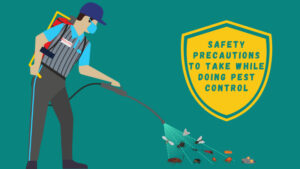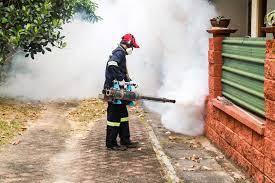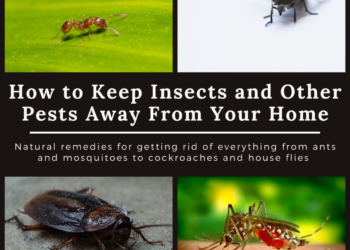As a homeowner, pest control is an important aspect of keeping your property clean and healthy.
Whether you have an ant infestation, rodent problem, or a bed bug outbreak, it’s crucial to deal with it quickly and effectively. While professional pest control services can be effective, they can also be expensive. That’s why many homeowners turn to DIY pest control methods to save money and take control of the situation themselves. In this guide, we’ll go over some simple and effective DIY pest control methods that you can use to keep your home bug-free.
- Identify the Pest
Before you can effectively deal with a pest problem, you need to identify what kind of pest you’re dealing with. This will help you determine the best course of action. For example, different pests may require different treatments or baits. Some common household pests include ants, cockroaches, bed bugs, rodents, and termites.

- Keep Your Home Clean
One of the best ways to prevent pests from entering your home is to keep it clean. Pests are attracted to food, water, and shelter, so it’s important to eliminate these attractants. Make sure to clean up spills and crumbs, store food in airtight containers, and take out the trash regularly. It’s also important to seal any cracks or gaps in your home’s walls, floors, and foundation to prevent pests from entering.
- Use Natural Remedies
There are many natural remedies that can help deter pests. For example, peppermint oil is a natural deterrent for ants and mice, while lavender oil can help repel moths. Diatomaceous earth is a natural insecticide that can be used to control crawling insects like ants, bed bugs, and cockroaches. You can sprinkle it around the perimeter of your home or apply it directly to affected areas.

Traps are a great way to capture and control pests. There are many types of traps available, including sticky traps, snap traps, and live traps. Sticky traps are ideal for catching crawling insects like spiders and roaches, while snap traps are effective for catching mice and rats. Live traps are a humane option for catching and releasing rodents.
- Use Pesticides
If natural remedies and traps aren’t effective, you may need to use pesticides. However, it’s important to use these products carefully and according to the manufacturer’s instructions. Always wear protective clothing and follow proper disposal procedures. It’s also important to use pesticides in a targeted manner, only applying them to affected areas.
- Take Precautionary Measures
Apart from the above-mentioned methods, taking precautionary measures can also help prevent pest infestations. Some of these measures include:
- Regularly inspecting and cleaning gutters to prevent water from accumulating and attracting pests.
- Removing piles of debris and wood from around the house to eliminate hiding spots for pests.
- Trimming tree branches and bushes to prevent pests from gaining entry to your home through them.
- Using screens on doors and windows to prevent pests from entering your home.
- Ensuring that all cracks and crevices in your home’s exterior are sealed.

- Seek Professional Help
If you have tried all DIY pest control methods and still cannot get rid of the pests, then it may be time to seek professional help. Professional pest control companies have the experience and expertise to handle all types of pests. They use effective methods and products that are safe for you, your family, and your pets. They also offer ongoing pest control services to help prevent future infestations.
There are many reasons why people avoid seeking professional help. Some may feel ashamed or embarrassed to admit that they need help. Others may feel that their problems are not significant enough to warrant professional intervention. However, it is important to remember that seeking help is a sign of strength and a step towards healing.
If you are struggling with mental health issues, there are many professionals who can help. Psychiatrists, psychologists, licensed therapists, and counselors are all trained to provide support and guidance to those in need. They can offer a safe and non-judgmental space to discuss your concerns and provide evidence-based treatments to help manage your symptoms.
Here are some reasons why seeking professional help is important:
- Professional help provides a safe and supportive space to talk about your concerns.
Sometimes it can be difficult to talk about our emotions and feelings, especially if we fear being judged or misunderstood. Seeking professional help provides a safe and confidential space where you can express yourself without fear of judgment. Your therapist or counselor will listen without bias and provide support and guidance.
- Professional help can help you manage your symptoms and improve your quality of life.
Mental health issues can be debilitating and impact all aspects of our lives. Professional help can provide evidence-based treatments such as cognitive-behavioral therapy, medication management, and other forms of therapy that can help manage your symptoms and improve your overall quality of life.
- Professional help can provide tools and strategies to help you cope with challenges.
Therapists and counselors can provide tools and strategies to help you cope with challenges and improve your resilience. They can help you develop coping skills and problem-solving strategies that can help you navigate difficult situations and build a more fulfilling life.
- Professional help can provide a fresh perspective on your problems.
Therapists and counselors can offer a fresh perspective on your problems and help you see things in a new light. They can help you identify patterns of thinking and behavior that may be contributing to your struggles and provide guidance on how to make positive changes.
- Professional help can provide a sense of validation and empowerment.
Talking to a professional about your struggles can provide a sense of validation and empowerment. It can help you feel heard and understood and provide a sense of hope for the future. This can be especially important if you have been struggling with mental health issues for a long time.
- Professional help can help you build a support network.
Therapists and counselors can help you build a support network of friends, family, and other professionals who can offer support and guidance. They can provide referrals to other professionals who can help you with specific issues, such as addiction or trauma.

Conclusion
Seeking professional help is an essential step towards healing and improving your mental health. If you are struggling with mental health issues, it is important to remember that you are not alone, and there are many professionals who can help. By seeking help, you are taking an important step towards bettering your life and improving your overall well-being.















